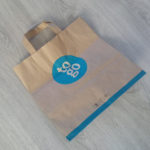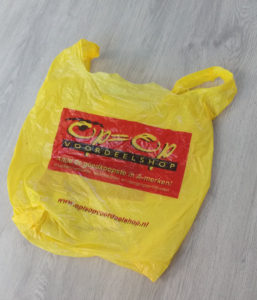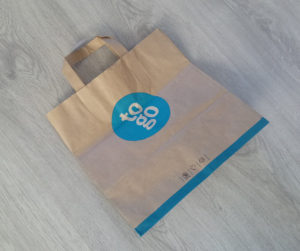
By Rahul Ramakrishnan
As a lifelong Belmont resident and Belmont High School alum, I take pride in Belmont’s forward-thinking mind-set and commitment to the environment. As a senior at MIT studying materials science, I have had the opportunity to learn about the diversity in production and policy surrounding the materials that make up our world. Recently, I thought about how I could use what I have learned to keep Belmont on an environmentally conscious trajectory, and an idea popped up.
Problems with Plastic—and Paper
For the last many years, we have repeatedly been told that paper bags are better for the environment than single-use plastic bags. Plastic bags are indeed the most visible form of plastic waste, and a quick Google search will reveal hundreds of photos and stories of plastic bags clogging up the environment and harming wildlife. Like many other towns and cities across the country, Belmont recently banned these plastic bags with the intent “to promote the use of reusable bags.”
Paper bags have now replaced plastic ones in Belmont, and they are indeed far better than plastic from the perspective of recyclability and solid-waste generation. But paper is far worse than plastic in one important aspect: carbon emissions.
Producing one paper bag emits three to four times as much carbon compared to producing one polyethylene plastic bag. Let that sink in: by switching bags from plastic to paper, Belmont may have tripled its carbon footprint with respect to bag production. Once you couple production emissions with the fact that paper production consumes carbon-capturing trees, the emissions results are even worse.
The extra carbon emissions in paper bag production largely come from the energy needed for raw materials extraction, and for transportation of the bags. The paper in paper bags is made of cellulose from trees; extracting and then pressing the cellulose pulp requires more energy than creating lightweight single-use plastic bags from oil. Paper bags also cost more to transport, because they weigh more per unit than plastic bags.
I want to be clear: we should not bring plastic back as a response to this. Plastic is still far worse than paper in post-consumer terms of waste generation, drainage system clogging, and a general lack of recyclability.
Paper bags, however, still have a larger carbon footprint compared to plastic bags. So how can we address emissions?
The answer lies in promoting reuse. The problem with paper bags is not that they are made of paper. It’s that they keep getting produced, used, and thrown out in a short timeframe. The key is to reuse one’s bags as much as possible, which has led many cities and states across the country to do what I’m proposing we do in Belmont: implement a town-wide 10-cent fee on paper bags.
This idea is neither unprecedented nor revolutionary. Our next-door neighbor, Cambridge, successfully implemented this policy in 2014. The fee goes back to the store where the bag was sold. It is not a tax. This is a tried-and-tested method for reducing paper-bag consumption. Since implementation, Cambridge’s paper-bag consumption has declined by 50% to 80%.
Cambridge is only one of many cities which have implemented such a policy to promote reusable bag usage. Boston has had a 5-cent minimum fee since 2018 on any checkout bag (including paper) at all retailers. Newton approved a 10-cent fee on checkout bags in July, 2019, which will go into full effect this summer, and Greenfield has a 5-cent minimum charge on bags going into effect in January, 2021.
Outside Massachusetts, cities that have passed fees on paper bags of at least 5 cents include Anchorage, Seattle, Boulder, Chicago, and Portland (Maine). New York City, the largest city in the country, has a 5-cent fee going into effect in March of this year. A 10-cent charge on paper bags went into effect in California in 2016, and a 5-cent equivalent started in Oregon earlier this year.
A fee on paper bags is simple and economical. Store owners need not change their inventory of paper bags. They may simply charge 10 cents for what they already have. A customer will not lose money by choosing to reuse. A typical durable polyester bag costs between 50 cents and $2 at Trader Joe’s and Whole Foods, for example, or is sometimes complimentary at a plethora of public events. By using such a bag more than five to 10 times, a customer would more than make up the initial outlay for the bag.
As a statutory city (not a town), Cambridge was able to implement a charge on paper bags without opposition at the state level, and the same holds in Boston, Newton, and Greenfield. Massachusetts towns, on the other hand, have typically felt unable to pass such bylaws because the Attorney General’s office has rejected proposals which include fees on paper bags, due to their conflict with the Home Rule Amendment governing town-level policy. The Home Rule Amendment disallows towns from enacting “private or civil law governing civil relationships except as an incident to an exercise of an independent municipal power.” According to the Attorney General’s office, “when a town bylaw purports to dictate to a retailer what products it must (or must not) charge its customers for, and how much a retailer must charge for the product, the bylaw fundamentally alters the retailer-customer relationship. Therefore, the proposed bylaw [charging a fee on paper bags] is an enactment of private or civil law governing civil relationships in contravention of the Home Rule Amendment.”
The limitations of the Home Rule Amendment, however, can be bypassed by having a town representative request approval for a specific law in the state legislature through home rule petition. If Belmont requests approval for a Belmont-specific law such as the paper bag fee via a petition approved by Town Meeting, then the paper bag fee will not be in contravention of the Home Rule Amendment. Belmont has submitted successful home rule petitions in the past, including a 2014 petition to issue more liquor licenses.
I have drafted a warrant article detailing this proposal for a town-wide fee on paper bags. The article closely follows the wording of ordinances passed in Cambridge and Newton, and includes definitions and terms present in Belmont’s plastic bag ban article. I am in the process of having conversations with Belmont-based businesses and community members to assess the town’s receptiveness to such an idea. So far, 94% of polled Town Meeting members have indicated that they would support this initiative, and in a recent meeting, Sustainable Belmont voted unanimously in favor of the idea.
Through this entire process, I have learned a lot about policymaking at the town level and engaging with the community. We have a simple and economical method for helping our environment, and as a lifetime Belmont resident, I am excited to drive this idea forward as much as possible.
Where to recycle plastic bags
Shaws, 535 Trapelo Road, Belmont
Star Market, 699 Mount Auburn Street, Cambridge
Target, 550 Arsenal Street, Watertown
Whole Foods Market, including 200 Alewife Brook Parkway, Cambridge
Farther afield, the following supermarkets have plastic bag recycling bins:
Big Y Foods
Hannaford Bros.
Price Chopper
Roche Brothers
Stop & Shop
Walmart
Rahul Ramakrishnan is a 2016 Belmont High School graduate and a student at MIT in the Department of Materials Science and Engineering.




Sorry, the comment form is closed at this time.